Regime Warns Filmmakers In Iran Not To Hire Actresses Who Remove Hijab

Iran’s government film watchdog has warned producers that if they give roles to actresses who have removed their hijab in public, their films could be banned.

Iran’s government film watchdog has warned producers that if they give roles to actresses who have removed their hijab in public, their films could be banned.
Films, music, books and art in general is strictly regulated, monitored and controlled by the Islamic government in Iran. Films or TV shows must first get a production permit to make sure they are in sync with the official ideology and religious restrictions. After a film is produced it is reviewed again for a screening permit.
Some websites in Iran on Sunday published the copy of a letter sent to film producers by Habib Eilbaygi a deputy in the government film watchdog, dubbed Cinema Organization. In the letter he says that producers “should refrain from employing” individuals who have been outspoken on the issue of hijab and “have ignored the country’s laws.”
Anti-hijab and anti-regime protests erupted in Iran in September 2022 after Mahsa Amini, a young woman was arrested in the street by the notorious ‘morality police’ and received fatal head injuries during here detention and later died in hospital.
Many celebrities, including actors and sports figures came out in support of the protests angering the regime. Dozens of women among them also removed their headscarves in public, a direct show of defiance against the ruling clerics.
Following the protests tens of thousands of ordinary women now walk in streets without hijab for the first time since the early 1980s.
Hardliners dominating all branches of government are now trying to restore their control and force women to observe hijab rules.

Prominent Iranian opposition figures have called for a three-month campaign of protests and strikes culminating in the murder anniversary of Mahsa Amini.
Exiled Prince Reza Pahlavi and football legend Ali Karimi published a tweet on Friday urging people to hold anti-regime protests and strikes to commemorate the killing anniversary of Mahsa Amini who was murdered by the Islamic Republic in September last year.
“Today is the birthday of the proud champion of the nation, Majidreza Rahnavard. Freedom-loving and patriotic Iranians across the world are honoring his memory. Let us turn Majidreza's birthday into the beginning of a three-month campaign and— with further planning, organization, and solidarity— prepare for protests and strikes on the anniversary of Mahsa Amini’s passing,” read their message.
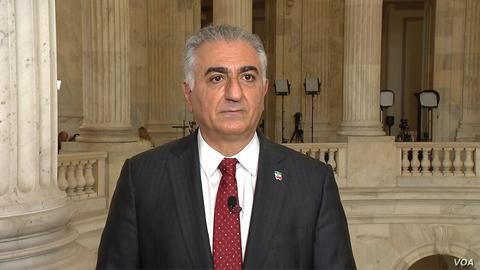
The twenty-three-year-old Majidreza Rahnavard was executed in December after the Iranian regime charged him with killing two members of security forces during ‘Woman, Life, Freedom’ protests. All protesters who were hanged or received long prison sentences were tried without due process of law, often even without their own defense attorney.
Activists on social media criticized the execution of the 23-year-old Rahnavard as "a criminal act" by the clerical establishment to deter dissent. He was apparently a constitutional monarchist.
Several other protesters were also executed by the Iranian regime after protests erupted following the killing of 22-year-old Kurdish Iranian woman Mahsa Amini on September 16 in the custody of morality police enforcing strict mandatory dress code laws.
The government has used thousands of well-armed regular and irregular forces to repress the protests, using severe beating, firing shotguns that have killed and blinded hundreds of people and even military weapons.
Meanwhile, tens of Iranians gathered in front of the UK’s Foreign Office in London on Friday to mark the birth anniversary of Majidreza Rahnavard and Abolfazl Adinezadeh.
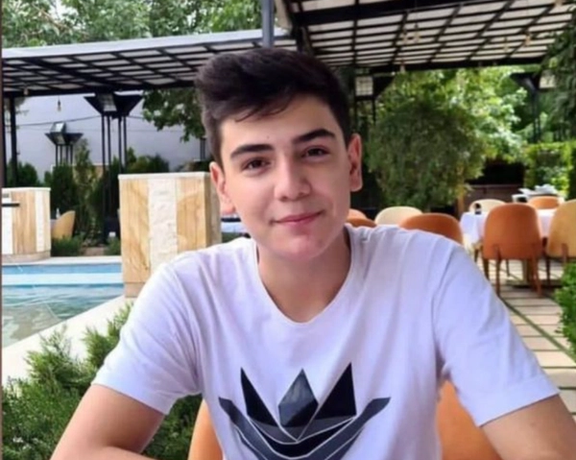
Iranian security forces killed Abolfazl Adinezadeh by firing dozens of shotgun birdshots at him at point-blank range in the city of Mashhad on October 8. He died as a result of liver and kidney damage, according to the BBC.
The security forces arrested the sister, father and uncle of Abulfazl at his grave on Friday.
In the evening of the same day, Abolfazl’s mother, and all their relatives were arrested in Faruj in North Khorasan Province.
The security and judicial authorities of the Islamic Republic forced his family to bury the body of the teenager in the cemetery of Najafabad village near Faruj. In the past months, his family was under pressure to keep silent regarding the murder of their son.
After their arrest, a number of families, whose beloved ones were killed during the protests, called for support for Adinehzadeh’s family, asking people to celebrate his birthday on Saturday.
Despite the government’s use of iron fist, it seems a new chapter of anti-regime protests would be opened across Iran on the eve of Maha Amini’s death anniversary.
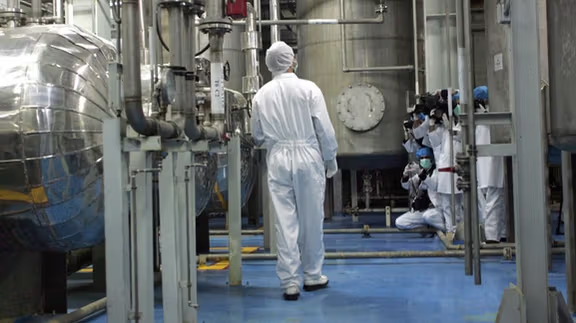
Israel could accept a deal between Iran and the United States if it includes rigorous supervision of Tehran's nuclear program, a senior lawmaker said Saturday.
According to Iranian and Western officials, the Biden administration is holding talks with Iran to sketch out steps that could include limiting the Iranian nuclear program.
These steps would be cast as an "understanding" rather than an agreement requiring review by the US Congress, such as the 2015 accord abandoned in 2018 by then-President Donald Trump.
The Biden administration has repeatedly denied media reports about a deal, acknowledging that contacts were made to clearly convey Washington’s positions. The latest denial came from Secretary of State Antony Blinken on Friday during a press conference.
“With regard to Iran, some of the reports that we’ve seen about an agreement on nuclear matters or, for that matter, on detainees are simply not accurate and not true,” Blinken said.
However, few are convinced that proposals about a deal are not on the table.
"It's not a wide-scope agreement, it's more like a small agreement, a memorandum of understanding, an M.O.U., and I think Israel can live with this if there is real supervision," Yuli Edelstein, head of the Israeli parliament's Foreign Affairs and Defence Committee, told Channel 12's Meet the Press.
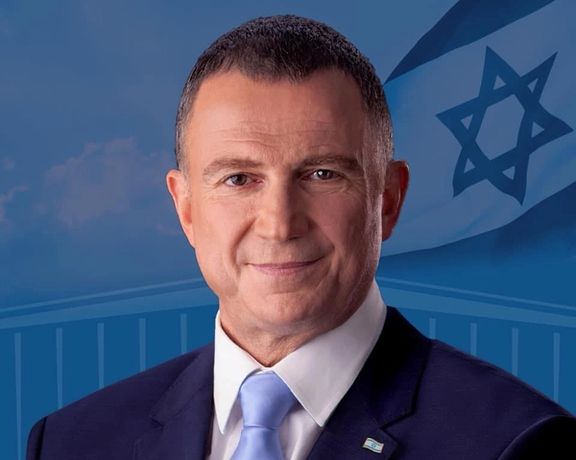
Prime Minister Benjamin Netanyahu's office declined comment on whether fellow Likud party member Edelstein's remarks reflected the views of the premier.
On Tuesday, before briefing the foreign affairs and defense committee, Netanyahu said in televised remarks: "Our position is clear. No agreement with Iran would obligate Israel, which will do everything required to defend itself.
"Our opposition to the deal - a return to the original (2015) deal - is working, I think."
"But there are still differences in outlook, and we do not hide these, regarding smaller agreements too. We have been stating our position clearly, both in closed and open sessions," Netanyahu said.
URANIUM ENRICHMENT
A core element of the possible understanding which remains unclear is the degree to which Iran would agree to rein in its uranium enrichment. Israeli officials in Netanyahu's circle have given potentially differing views on the issue this month.
Netanyahu's national security adviser, Tzachi Hanegbi, said Israel didn't see as much "damage" in any new understanding as there was in the 2015 deal, but it was "poised" for any Iranian shift to more than 60 percent fissile purity.
"That would already be a clear acknowledgment that the uranium enrichment is for weapons needs," Hanegbi said in an interview published on Friday in newspaper Israel Hayom, referring to the 90-percent fissile purity required for a bomb.
But last week, Strategic Affairs Minister Ron Dermer - who accompanied Hanegbi to Washington talks about Iran - voiced misgivings about any "freeze" of current enrichment levels.
"It means that you reconcile with a higher level of enrichment in Iran. And we thought that was a bad idea then, and we think it's a bad idea today," he told the AJC Global Forum in Tel Aviv.
However, Israeli Channel 12 news reported that US Secretary of Defense Lloyd Austin and Israeli Defense Minister Yoav Gallant met Thursday on the sidelines of NATO meeting in Brussels and reached understandings in the light of an emerging nuclear deal between Tehran and Washington.
Having failed to revive the 2015 deal, US President Joe Biden's administration hopes to restore some limits on Iran to keep it from getting a nuclear weapon that could threaten Israel and trigger a regional arms race.
Critics of a limited deal say that Iran would end up keeping the 60-percent enriched uranium, which means the status of a nuclear threshold state, while receiving financial rewards by US allowing other countries to release frozen funds and perhaps some sanctions relief.
Based on reporting by Reuters
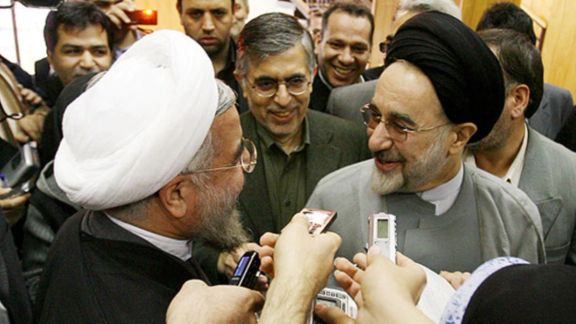
Two of Iran's former presidents, Hassan Rouhani and Mohammad Khatami have highlighted Iran's missed foreign policy opportunities, blaming hardliner conservatives.
Referring to Iran's rapprochement with Saudi Arabia, Rouhani said during a recent meeting with his aides, "It is good that everyone in Iran has understood that you cannot write slogans on missiles, set fire to embassies and make trouble."
Rouhani was referring to the IRGC's behavior following the 2015 JCPOA nuclear deal with the West when they wrote "Death to Israel" on missiles they tested, and the conservative-led vigilantes' behavior in an arson attack on the embassy of Saudi Arabia in January 2016 which led to the severance of ties between Tehran and Riyadh for seven years.
The Obama administration concluded the JCPOA agreement hoping to restrict Iran’s nuclear program and open the door to more moderating diplomatic interaction.
The nuclear deal was concluded during Rouhani’s term in office (2013-2021), who is considered a pragmatist and a moderate compared to many other regime insiders.
But both the permission to conclude the deal and the extremist behavior by hardliners were condoned by Supreme Leader Ali Khamenei. The first was to lift international sanctions, and the second was to continue his anti-West, anti-Israel policies.
Meanwhile, in a reference to the resumption of ties with Saudi Arabia and Supreme Leader Ali Khamenei's recent statement about cooperation with the UN nuclear watchdog IAEA, Rouhani welcomed "the agreements with the IAEA and Saudi Arabia."
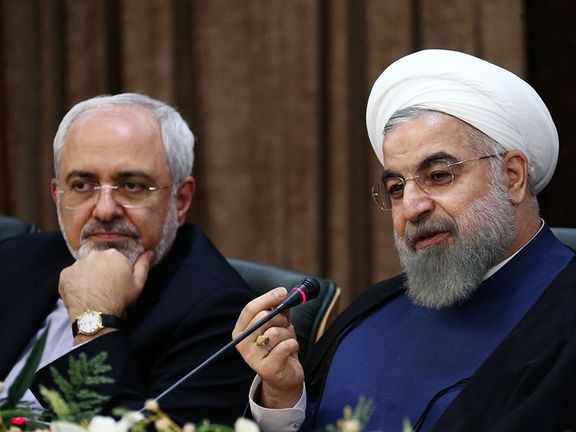
Speaking on domestic politics and the political impasse created by hardliners restricting voters’ choices in parliamentary and presidential elections, Rouhani said: "What determines the country's fate is the people's vote. Everyone in this country acknowledges the power of votes. Without the people's vote we cannot solve any problem."
He added that Iran's population is 85 million and the government should stop keeping only three million of them happy.
Rouhani was alluding to the rule of minority following the consolidation of conservatives' political power after the 2020 parliamentary elections and the 2021 presidential election in which reformist and moderate candidates were barred from running.
Rouhani said: "Five months have passed since the protests in Iran. What have we done during these five months? It is not enough that the streets are calm. We should look for solutions for social problems to prevent further unrest." Nonetheless, he acknowledged that the political situation cannot be corrected overnight as structural changes are required to make the people happy.
Meanwhile, in a message to the congress of the National Development Party, former ‘reformist’ President Mohammad Khatami also pointed out roughly the same issues. Echoing Rouhani, Khatami said: "Had the nuclear deal been revived two years ago, we would have profited substantially. Nonetheless, anything that can improve the situation a little bit is desirable."
Meanwhile, he called on the government to respect the people's views and votes and their right to determine their fate. Khatami said in his message that "there is more fear and concern than hope in the Iranian society today." Like Rouhani, Khatami also advised that "the people need hope, they need to see an improvement in their political and financial situation."
He said the government's new approach to foreign policy that was manifested in the resumption of ties with Saudi Arabia was an example of what is needed to being about positive change in Iran.
Some of Iran's political observers, including Abolfazl Hassanbeigi, a veteran of the Iran-Iraq war and a former populist member of parliament, told a local website that the situation is ripe for rapprochement with the West, adding that US President Joe Biden needs a winning chip for his re-election campaign, even a short-term agreement with Iran.
Hassanbeigi opined that such a short-term and limited agreement will be mutually beneficial for both Iran and the United States. He claimed US officials have realized that their approach to Iran during recent years has weakened the United States and strengthened Iran.
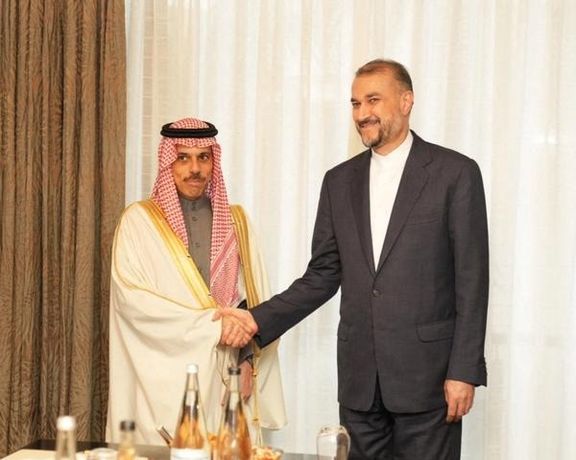
Saudi Arabia's Foreign Minister Prince Faisal bin Farhan arrived in Tehran as Iran and the kingdom continue to develop their newly re-established relations.
Iran’s Foreign Minister Hossein Amir-Abdollahian welcomed the Saudi delegation on their arrival and then held talks with his Arab counterpart.
The two were going to have joint press conference when bin Farhan refused to speak under Qassem Soleimani’s picture.
Soleimani, commander of the Revolutionary Guards (IRGC) extra-territorial Quds Force, was killed in Baghdad along with nine others in 2020 by a drone strike ordered by former US President Donald Trump.
The Qods Force under Soleimani became deeply involved in the conflicts in Syria and Iraq, setting up militant proxy militias.
After the press conference was relocated, bin Farhan said his country's relations with Iran are based on the principles of non-interference in each other's internal affairs. He added that Tehran-Riyadh cooperation is important in ensuring the safety of navigation in the region and on non-proliferation of weapons of mass destruction.
In turn, Amir-Abdollahian claimed that according to the Islamic Republic security is not the same as militarism.
According to reports, the Saudi minister may also meet with Iranian President Ebrahim Raisi, who just returned from a Latin American tour.
A deal brokered by China in March ended a diplomatic rift between Iran and Saudi Arabia, and re-established relations following years of hostility that threatened regional stability in Yemen, Syria, and Lebanon.
On June 7, Iran reopened its embassy in Saudi Arabia.
In 2016, protesters attacked the Saudi embassy in Tehran in retaliation for Riyadh's execution of a prominent Shiite cleric, which led to Riyadh severing its ties with Tehran.
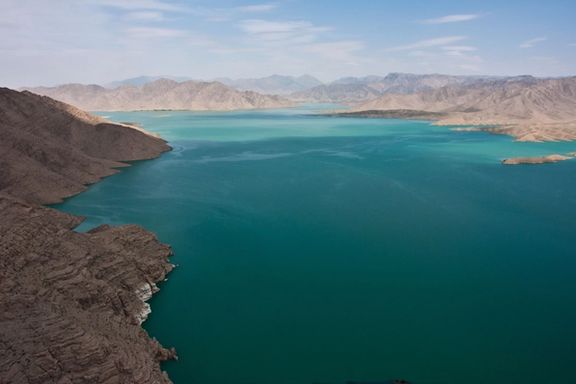
Iran’s interior minister claims the borders with Afghanistan are calm and traffic is normal after recent clashes between the Taliban.
“We warned the Afghan rulers that they should train their forces and be watchful of their acts, otherwise Iran's border guards defend national interests and do not allow anyone to violate the security of borders,” said Ahmad Vahidi on Saturday.
In the past days, there were some issues, but they were dealt with forcefully to maintain security at the borders, said Vahidi who is an ex-IRGC general, wanted by Interpol for his role in the bombing of a Jewish community center in Buenos Aires in 1994.
“Of course, terrorists try to abuse the tensions at borders, but they should be aware that they will be punished for their actions.”
In late May, clashes at the border over water rights claimed the lives of at least two Iranians and one Taliban soldier.
Disputes between Tehran and Kabul have risen over Taliban’s refusal to share the waters of the Helmand River in violation of a 1973 treaty.
Iran's parched eastern regions is seriously threatened if the Taliban prevent water from reaching Iran. Another Iranian official said Saturday that Kabul has agreed to allow Iranian experts examine the water reservoirs inside Afghanistan.
Earlier in May, Iranian President Ebrahim Raisi warned the Taliban over disregarding Iran's water rights under the 1973 treaty. The Taliban rejected Raisi's apparent threat, with a former Taliban official mocking Raisi in a video that went viral.